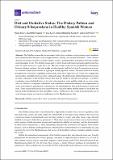Por favor, use este identificador para citar o enlazar a este item:
http://hdl.handle.net/10261/188936COMPARTIR / EXPORTAR:
 SHARE SHARE
 CORE
BASE CORE
BASE
|
|
| Visualizar otros formatos: MARC | Dublin Core | RDF | ORE | MODS | METS | DIDL | DATACITE | |

| Título: | Diet and oxidative status. The dietary pattern and urinary 8-isoprostane in healthy spanish women |
Autor: | Ruiz, Nuria; Segarra, Ana Belén; Lara Escribano, Luis CSIC ORCID; Ramírez-Sánchez, Manuel; Prieto, Isabel | Fecha de publicación: | 2-ago-2019 | Editor: | Multidisciplinary Digital Publishing Institute | Citación: | Antioxidants 8(8): 271 (2019) | Resumen: | The Mediterranean diet is associated with a low incidence of physiologic and metabolic non-communicable diseases such as hypertension, obesity, and insulin resistance. These chronic diseases are closely related to oxidative status, which is determined by the balance between oxidant and antioxidant levels. The Mediterranean diet is rich in foods with important antioxidant properties, such as fruits and extra virgin olive oil. The aim of this work was to establish the relationship between dietary patterns, the total intake of polyphenols, and the levels of 8-isoprostanes in urine, as a marker of lipid peroxidation, in a group of healthy Spanish women. The main sources of dietary polyphenols were fruits, vegetables, pulses, nuts, and extra virgin olive oil. There was a significant and positive correlation between the estimated intake of polyphenols, total polyphenols excreted in urine, adherence to the Mediterranean diet, and the intake of specific food groups. A positive correlation was established between the total polyphenols in urine and the intake of raw extra virgin olive oil. However, a negative correlation was established between the amount of 8-isoprostanes in urine, total intake of polyphenols, adherence to the Mediterranean diet, and the intake of fruits and nuts. These results indicate an association between oxidative status and the intake of foods that are typical of the Mediterranean diet, in healthy women. Furthermore, the results demonstrate the use of urine 8-isoprostanes as a marker of adherence to the Mediterranean diet. | Versión del editor: | https://doi.org/10.3390/antiox8080271 | URI: | http://hdl.handle.net/10261/188936 | DOI: | 10.3390/antiox8080271 | E-ISSN: | 2076-3921 |
| Aparece en las colecciones: | (EEZ) Artículos |
Ficheros en este ítem:
| Fichero | Descripción | Tamaño | Formato | |
|---|---|---|---|---|
| Diet_Ruiz_Art2019.pdf | 2,3 MB | Adobe PDF |  Visualizar/Abrir |
CORE Recommender
PubMed Central
Citations
2
checked on 29-abr-2024
SCOPUSTM
Citations
4
checked on 23-abr-2024
WEB OF SCIENCETM
Citations
4
checked on 24-feb-2024
Page view(s)
151
checked on 01-may-2024
Download(s)
102
checked on 01-may-2024

